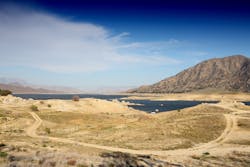Biden-Harris Administration Announces $210 Million for Drought Resilience Projects In the West
The Department of the Interior today announced $210 million from President Biden’s Bipartisan Infrastructure Law that will bring clean, reliable drinking water to communities across the West through water storage and conveyance projects.
The projects are expected to develop over 1.7 million acre-feet of additional water storage capacity, enough water to support 6.8 million people for a year. The funding will also invest in two feasibility studies that could advance water storage capacity further once completed.
“In the wake of severe drought across the West, the Department is putting funding from President Biden’s Bipartisan Infrastructure Law to work to expand access to clean, reliable water and mitigate the impacts of this crisis,” said Secretary Deb Haaland. “Water is essential to every community – for feeding families, growing crops, powering agricultural businesses, and sustaining wildlife and our environment. Through the investments we are announcing today, we will advance water storage and conveyance supporting local water management agencies, farmers, families and wildlife.”
“Through the Bipartisan Infrastructure Law, the Biden-Harris administration is dramatically advancing our mission at the Bureau of Reclamation to deliver water and power in an environmentally and economically sustainable manner for the American West,” said Bureau of Reclamation Commissioner Camille Calimlim Touton. “Our investment in these projects will increase water storage capacity and lay conveyance pipeline to deliver reliable and safe drinking water and build resiliency for communities most impacted by drought.”
The Bipartisan Infrastructure Law allocates $8.3 billion for Bureau of Reclamation water infrastructure projects over the next five years to advance drought resilience and expand access to clean water for families, farmers, and wildlife. The investment will repair aging water delivery systems, secure dams, and complete rural water projects, and protect aquatic ecosystems. The funding announced today is part of the $1.05 billion in Water Storage, Groundwater Storage and Conveyance Projects provided by the Law.
The selected projects are:
Arizona:
Verde River Sediment Mitigation Study: $5 million to provide the federal cost share for conducting the Verde River Sedimentation feasibility study, which would identify alternatives to restore at least 46,000 acre-feet of water storage lost due to accumulation of sediment at Horseshoe Reservoir. It would also determine a plan for future management of sediment at Horseshoe and Bartlett Reservoirs and investigate potential operational flexibilities created with increased storage capacity to assist in mitigating impacts of drought and climate change on water availability. An appraisal study was completed in 2021.
California:
B.F. Sisk Dam Raise and Reservoir Expansion Project: $25 million to the San Luis and Delta-Mendota Authority, to pursue the B.F. Sisk Dam Raise and Reservoir Expansion Project. The project is associated with the B.F. Sisk Safety of Dams Modification Project. Once complete, the project will develop approximately 130,000 acre-feet of additional storage.
North of Delta Off Stream Storage (Sites Reservoir Project): $30 million to pursue off stream storage capable for up to 1.5 million acre-feet of water in the Sacramento River system located in the Coast range mountains west of Maxwell, California. The reservoir would utilize new and existing facilities to move water into and out of the reservoir, with ultimate release to the Sacramento River system via existing canals, a new pipeline near Dunnigan, and the Colusa Basin Drain.
Los Vaqueros Reservoir Expansion Phase II: $82 million to efficiently integrate approximately 115,000 acre-feet of additional storage through new conveyance facilities with existing facilities to allow Delta water supplies to be safely diverted, stored and delivered to beneficiaries.
Colorado:
Arkansas Valley Conduit: $60 million to continue the facilitation of supplying a safe, long-term water supply to an estimated 50,000 people in 40 rural communities along the Arkansas River. Once complete the project will replace current groundwater sources contaminated with radionuclides and help communities comply with Environmental Protection Act drinking water regulations through more than 230 miles of pipelines designed to deliver up to about 7,500 acre-feet per year from Pueblo Reservoir.
Montana:
Dry Redwater Regional Water System Feasibility Study: $3 million to provide the authorized federal cost-share for finishing the Dry Redwater Regional Water System Feasibility Study.
Washington:
Cle Elum Pool Raise: $5 million to increase the reservoir’s capacity an additional 14,600 acre-feet to be managed for instream flows for fish. Additional efforts include shoreline protection that will provide mitigation for the pool raise.
The Department also recently announced new steps for drought mitigation in the Colorado River Basin supported by the Inflation Reduction Act, releasing a request for proposals for water system conservation measures as part of the newly created Lower Colorado River Basin System Conservation and Efficiency Program. The Act provides $4 billion in funding for water management and conservation in the Colorado River Basin, including at least $500 million for projects in the Upper Basin states that will result in water conservation throughout the system.


